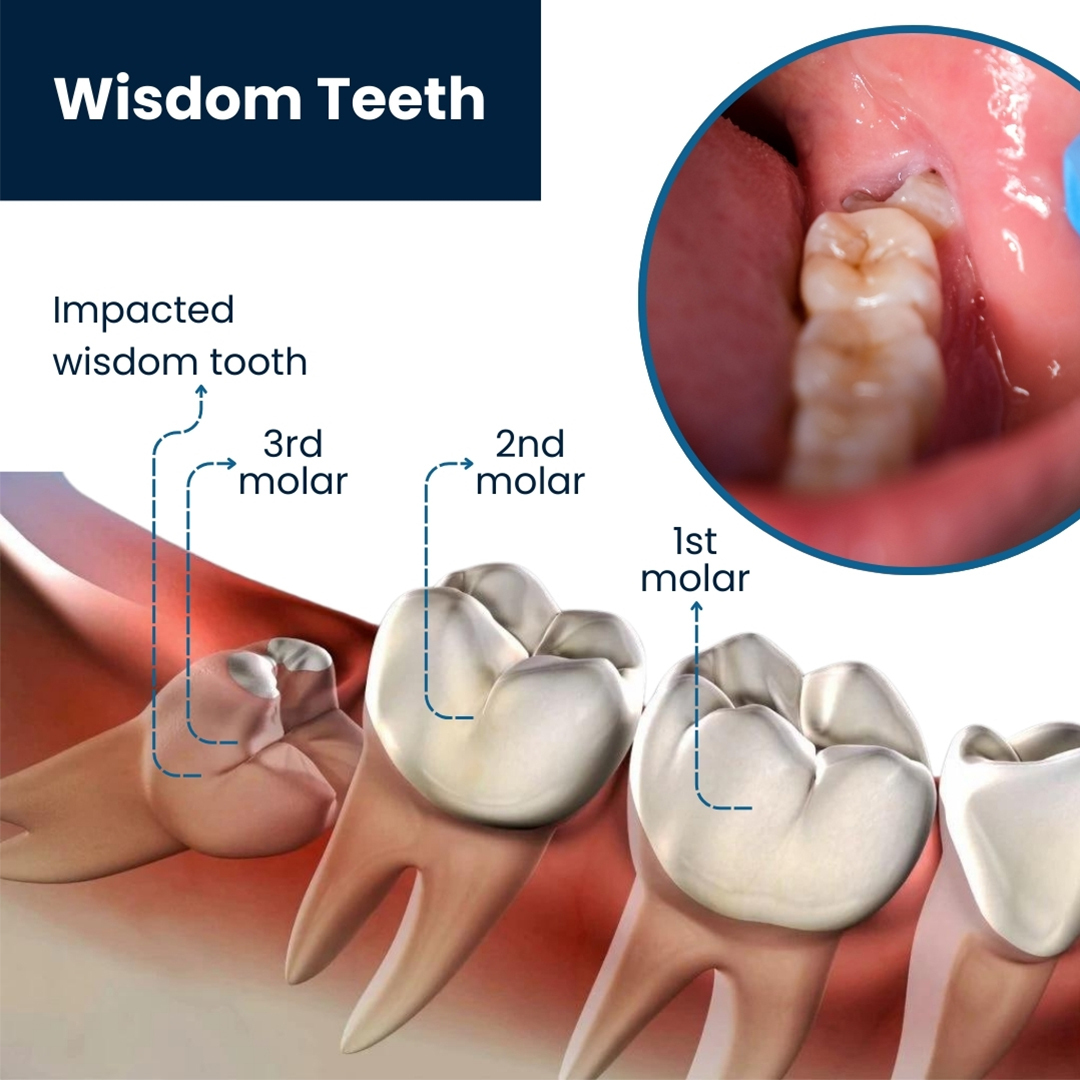Medical References
Dodson, Thomas B., and Srinivas M. Susarla. "Impacted wisdom teeth." BMJ clinical evidence 2014 (2014): 1302.
.svg)
.svg)
.svg)
.svg)

Wisdom tooth pain is caused mainly by impacted teeth. Impacted teeth are teeth that don’t have enough room to come through the gum. When a tooth erupts at an incorrect angle and gets stuck, the gums become exposed and creates pockets where food and bacteria can get trapped. The resulting inflammation and infection contribute largely to wisdom tooth pain.
Left untreated, the pain will only escalate. Don’t wait until it’s too late. Contact Nuffield Dental for an appointment today.
When wisdom tooth pain strikes, it can be hard to focus on daily life. If your symptoms are mild and you’re waiting to see a dentist, some simple remedies may help ease discomfort at home.
If pain persists, worsens, or you have swelling that will not go away, speak to your dentist as soon as possible.
These options are available in pharmacies like Watsons and Guardian in Singapore.
Please check with your doctor/dentist if these OTC products are suitable for you.
Acupuncture
Acupuncture, which uses tiny needles, has been studied for its ability to treat pain in alternative medicine. Notably, acupuncture was more effective than a control intervention in reducing the severity of acute dental pain, according to a 2019 randomized research.
Wisdom tooth surgery gets rid of wisdom tooth pain by removing the cause of the pain which is often inflammation, infection or pressure on surrounding teeth caused by the impacted wisdom tooth.
Extraction is typically needed in the following situations:
If the pain is excruciating, don’t hesitate to contact our emergency dentist.


You may need removal if your wisdom tooth causes:
Your dentist will check your mouth and take X-rays to decide if removing the tooth is best for your health.
Here’s what to expect during wisdom tooth surgery:
Immediately After the Procedure:
First Few Hours Following the Procedure:
Within the First 24 Hours After the Procedure:
From the First 24 Hours Following Surgery:
48 Hours Following the Procedure:
If you suspect that your wisdom tooth surgery wasn’t done correctly, please book an appointment with us for an accurate diagnosis.
Depending on type, wisdom tooth extraction costs can vary widely in 2026.
| Wisdom Tooth Pain Treatments | Price Range (SGD $) |
|---|---|
| Impacted wisdom tooth extraction | SGD $200 - SGD $2,500 per tooth |
| Non-surgical extraction (Simple extraction) | Starts at SGD $150 per tooth |
| Surgical extraction | Starts at SGD $950 per tooth |
| Complex surgical extraction | SGD $800 - SGD $1,700 per tooth (up to SGD $2,000 for highly complex cases) |
| Emergency wisdom tooth extraction | SGD $950 - SGD $1,800 per tooth (may be subject to surcharges) |
Final fees are confirmed after a clinical assessment and imaging review. Emergency or complex cases may affect the overall cost.
*All fees are subject to prevailing Singapore Goods and Services Tax.
*Fee adjustments may apply depending on the number of teeth treated.
If you have a CHAS Blue or CHAS Orange card, you can receive subsidies for basic dental care, including simple wisdom tooth extractions. For more complex procedures, like surgery to remove an impacted wisdom tooth, you can use your MediSave account. You can claim up to SGD $1,550 per surgery.
Talk to your dentist to check what subsidies you qualify for and what documents you need.
If you are unsure what’s causing your discomfort, visit a dentist. They can find the source of the pain and talk to you about the next steps.
At Nuffield Dental clinic, your dental needs are cared for by our dedicated team of dentists.

Specialisation
Wisdom Tooth Surgery
Training
BDS (Singapore)

Root Canal Treatment Cost
The price varies according to the unique treatment prescribed to each individual patient. For example, if a root canal treatment is require for more than one root, the cost would go up as well. However, saving the tooth with a Root Canal treatment is relatively cost-efficient in the long run.
A Root Canal Treatment procedure in Singapore's price ranges from S$500 - S$1700. However, the price may or may not include the crowning of the tooth and consultation charges. Average consultation prices of dental services in Singapore ranges from S$75- S$200.
Is a Root Canal Treatment procedure painful?
Can I go about my day to day activities after a Root Canal Treatment?
Most patients are able to return to school or work the next day following a Root Canal Treatment. However, it is advised against eating immediately post-surgery as there may be numbness in the affected area.
What are the side effects of a Root Canal Treatment?
What is the aftercare for a Root Canal Treatment?
Can a Root Canal Treatment be unsuccessful?
Nuffield Dental Jewel
Wheelock Place501 Orchard Road #05-01 Singapore 238880

Nuffield Dental Seletar
Greenwich V
1 Seletar Road #01-07/08
Singapore 807011

Nuffield Dental Kovan
Simon Plaza
2 Kovan Road #01-03
Singapore 548008

Nuffield Dental Serangoon Gardens
Serangoon Garden Estate
57 Serangoon Garden Way
Singapore 555953

Nuffield Dental Siglap
The Domain
914 East Coast Road #01-03
Singapore 459108

Nuffield Dental Simpang Bedok
East Village
430 Upper Changi Road #01-64
Singapore 487048

Nuffield Dental Holland Village
7 Holland Village Way #03-16
Singapore 275748

Nuffield Dental Westgate
Westgate
3 Gateway Dr #04-32
Singapore 608532

Nuffield Dental HarbourFront
HarbourFront Centre
1 Maritime Square #02-64A
Singapore 099253

Nuffield Dental Jewel
Wheelock Place
501 Orchard Road #05-01
Singapore 238880

Nuffield Dental Raffles Place
One Raffles Place
1 Raffles Place #05-19
Singapore 048616

FAQs
Very common. Impacted wisdom teeth affect 9 in 10 people in their lifetimes.
You might notice a dull ache, pressure, or sharp pain at the back of your mouth. Sometimes the gums around the tooth feel sore or swollen. The pain can start off mild and get worse over time, or it can appear suddenly.
Try rinsing your mouth with warm salt water, using a cold compress, or taking over-the-counter pain relief like ibuprofen. Avoid chewing on the sore side, eat soft foods, and keep the area clean. For severe or long-lasting pain, see your dentist.
Yes, a painful wisdom tooth can be an emergency and should be taken seriously. Swelling, difficulty swallowing, fever, or severe pain that doesn't respond to painkillers are urgent signs. These could indicate a serious infection or another problem needing immediate dental care to avoid further complications. When in doubt, contact your dentist promptly.
Wisdom tooth pain often lasts a few days to a week, especially while the tooth pushes through your gums. If the tooth is impacted or infected, pain can last longer and may keep returning until a dentist treats it. Monitor your symptoms and see a dentist if the pain continues.
Sometimes wisdom tooth pain settles on its own, especially if the tooth erupts without getting stuck. If pain keeps coming back or gets worse, see a dentist to rule out infection or other issues.
You can, but it may affect your quality of living. To prevent complications like gum disease, we recommend seeing a dentist as soon as symptoms start to show.
Wisdom tooth pain most commonly occurs when the teeth erupt, typically between 17 and 25 years old. However, pain can happen later if impaction, infection, or other issues arise.
Wisdom teeth often cause problems because there isn’t enough room for them to come in properly. They can press against other teeth, become stuck (impacted), or cause infections. The position of wisdom teeth makes them harder to keep clean and increases the risk of problems.
When a wisdom tooth partially erupts, the gums expand and become inflamed. Inflammatory cells are released to the area to fight against microorganisms when the body's natural defensive reaction kicks in, momentarily relieving the discomfort. However, this region still serves as a trap for bacteria and food particles because the partially erupted tooth and the associated gum pocket are still present. The cycle is restarted when additional food becomes stuck and bacteria proliferate, causing the tissue to become inflamed once more and the discomfort to return.
Pain often peaks around the second or third day after extraction. Swelling and soreness are usually highest at this time. Follow your dentist’s advice for pain relief and care to help healing.
Dodson, Thomas B., and Srinivas M. Susarla. "Impacted wisdom teeth." BMJ clinical evidence 2014 (2014): 1302.
Fill out the form for any request or questions you have and we will contact you within one working day..


Nuffield Dental is a one-stop, multi-disciplinary dental care centre in Singapore. At Nuffield, we put you first. We believe in providing personalised service for each patient.
Nuffield Dental is a one-stop, multi-disciplinary dental care centre. Here at Nuffield Dental, we pride ourselves of our personalised oral care for each and every one of our patients. We need to make sure you get all the help you need to make your dental procedures comfortable, accessible and seamless.

Our dentists have been accredited in root canal and oral surgery for 20+ years. We have accredited dental providers who are skilled in the area of dental implant surgery.
The newest and best lifestyle articles selected by our editorial team.

Why the Global Phase-Down Is Happening Mercury is listed by the WHO as one of the top ten chemicals of public health concern. In dentistry, the...

Current scientific evidence does not show a conclusive connection between intact dental amalgam fillings and symptoms such as brain fog, chronic...

The Minamata Convention on Mercury established 2034 as the global target year to end the use of dental amalgam. While this may seem gradual, the...